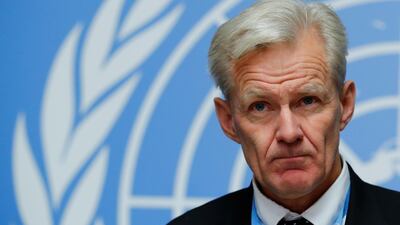The UN urged the Syrian government to allow for the immediate evacuation of civilians from the besieged Damascus suburb of eastern Ghouta, as peace talks continued in Geneva in a bid to end the six-year conflict.
Jan Egeland, the UN humanitarian adviser for Syria, said that the situation had become a “humanitarian emergency”, adding that nine people had died in the last few weeks while awaiting permission from the Syrian government for the sick and wounded to be evacuated to hospitals just 40 minutes away from the capital.
He called on world powers on Thursday to help arrange the immediate evacuation of 500 people, including 167 children.
“Men with power are sitting with lists of children who urgently need to be evacuated in east Ghouta and we still don’t have green light from the government,” he told a press conference in Geneva.
"Eastern Ghouta, next door to Damascus, is the eye of the hurricane, it is the epicentre of this conflict. At the moment there are 400,000 people there.”
UN convoys have delivered in the past two months supplies to 68,000 of the 400,000 trapped civilians.
“Our not being able to reach eastern Ghouta for many months in most of the areas has now led to an undoubtedly catastrophic situation," Mr Egeland said.
Acute malnutrition rates among children there is nearly 12 per cent, above the 10 per cent emergency threshold, and a five- or six-fold increase since January, he added.
"In general there is no de-escalation zone, there is only escalation in this de-escalation zone," Mr Egeland said.
"That has ended in eastern Ghouta except for [a pause of] two days only, there has been a massive loss of civilian life, hundreds have been wounded.
"We need sustained calm to be able to feed 400,000 people who now beyond doubt are in a humanitarian emergency.”
The eastern Damascus suburb is among the last remaining opposition strongholds in Syria and located in one of four so-called "de-escalation zones", where fighting between regime forces and rebels was supposed to cease under a deal brokered by Russia, Iran and Turkey earlier this year.
On Tuesday, the Syrian government agreed to a ceasefire in rebel-held Eastern Ghouta, which has been under siege by government forces since 2013.
“We as humanitarians are frustrated, angry and outraged at how the war in Syria is going for civilian population,” said Mr Egeland, adding: “The success rate of UN security council is very low in terms of helping us get to those in need, the few times we have been able to get through is by the push of actors in terms of resolutions.”
Russia, Iran, the US and France had pledged to help during the weekly humanitarian meeting, he said.
____________
Read more
Syria opposition: Release of political prisoners would be ‘game changer’
Syria’s opposition wants Russian pressure for peace within six months
Syrian regime mocks Geneva peace talks
____________
Meanwhile, Staffan de Mistura, UN’s special envoy to Syria and mediator at the talks, conducted on Thursday a vigorous diplomacy shuttle between Syria’s High Negotiations Committee (HNC) and the regime in Geneva.
He aims to ensure that both groups remain in contact, as the Syrian government delegation has refused to hold direct talks with the opposition.
The government delegation is headed by Syria’s UN ambassador and chief negotiator Bashar Al Jaafari. The regime’s delegation has always rejected the opposition’s demand that Syrian leader Bashar Al Assad leave power, calling them “terrorists” who lacked the legitimacy to negotiate.
In response, since the opposition’s arrival to the Swiss city, Nasr Al Hariri, the opposition delegation chief, has repeatedly called for direct talks with the regime.
“The opposition is united and is ready to hold direct negotiations with the government,” Mr Hariri said ahead of a meeting with UN officials on Wednesday evening.
Mr Hariri said that the opposition has no preconditions for talks but it does expect to speak about all the details of a political transition, which include the fate of Mr Assad.
Negotiators of the Syrian government arrived in Geneva on Wednesday morning and held initial talks with Mr de Mistura.
The government delegates delayed their planned departure for the talks, which began on Tuesday, because of the opposition’s insistence Mr Al Assad should step down. With regime representatives absent, the unified opposition delegation met with UN officials in Geneva on Tuesday alone.
A breakthrough in the talks is seen as unlikely as Mr Al Assad and his allies push for total military victory in Syria’s civil war, now in its seventh year, and his opponents stick by their demand he leaves power.
The spokesman for the Syrian Negotiation Commission (SNC), Dr Yahya Aridi, said that discussions with Mr de Mistura were "good".
"Now we look forward to moving into serious negotiations on transition to freedom in Syria: freedom for the detainees, freedom from violence for all our people," he said following the meeting with UN envoy.
"We have presented ideas for discussion on behalf of our united delegation. This is the first fruit of the extended meeting in Riyadh of the revolutionary and opposition forces.
"A political solution is the only way to bring security and stability to Syria. We are ready to stay engaged in the talks for as long as necessary."


